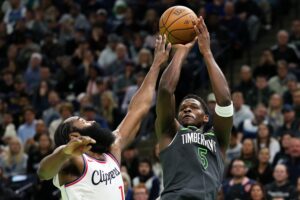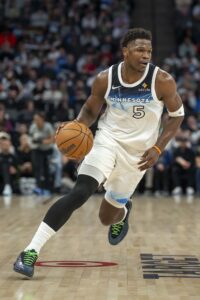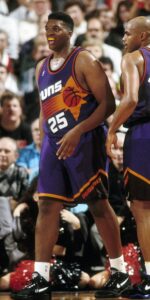The Thunder already secured the top seed in the Western Conference and seem on their way to clinching the top overall seed entering the 2025 playoffs. However, the five remaining guaranteed playoff spots in the West are still up for grabs.
 The Rockets have been playing excellent basketball over the past few weeks and have surged up to No. 2 in the West with a 48-26 record. Only a catastrophic collapse would prevent them from earning a top-six seed, as they hold a 5.5-game lead on the No. 7 Warriors with eight games remaining.
The Rockets have been playing excellent basketball over the past few weeks and have surged up to No. 2 in the West with a 48-26 record. Only a catastrophic collapse would prevent them from earning a top-six seed, as they hold a 5.5-game lead on the No. 7 Warriors with eight games remaining.
The Nuggets, who are currently the No. 3 seed with a 47-28 record, are also in a strong position to earn a guaranteed playoff berth, as they’re four games up on Golden State with seven games remaining. It’s worth noting that Houston and Denver have among the most difficult remaining schedules, per Tankathon, but both clubs have a decent cushion on their closest competitors.
Saturday’s game between the Lakers and Grizzlies was a key matchup for both teams. The No. 4 Lakers (45-29) emerged victorious and earned the head-to-head tiebreaker on the No. 5 Grizzlies (44-30).
Even after the win though, the Lakers are just 5-8 over their past 13 games. They also have the second-hardest remaining schedule of any team, including four matchups against Oklahoma City and Houston over their final eight games.
The slumping Grizzlies are just 1.5 games ahead of the Clippers and Warriors, who hold identical 42-31 records, and two games up on the No. 8 Timberwolves (42-32). The Clips hold the tiebreaker on the Dubs, which is why they’re currently the No. 6 seed.
To word it in a different way: Only three games separate the Nos. 4-8 seeds in the West. And by opponent winning percentage, Minnesota has — by far — the easiest schedule left of the group.
Of the five teams bunched together in the standings, the Clippers and Warriors are the only ones with nine games left; the other three each have eight.
Securing a top-six seed is critical, as it ensures teams will make the playoffs outright. Those who fall outside of the top six will have to compete in the play-in tournament to try and claim the final two playoff spots in the West. Dallas, Sacramento and Phoenix are essentially in a three-way race for the ninth and tenth seeds and thus the final two spots in the play-in.
We want to know what you think. Aside from the Thunder, which other five teams will secure top-six seeds in the West? Which teams will be heading to the play-in tournament? Head to the comments section to weigh in.
 It’s the second time in Edwards’ career – and the first time this season – that he has earned Player of the Week honors. He led the Timberwolves to a 3-0 week from March 10-16, as the team defeated Denver, Orlando, and Utah by an average of 17.7 points per game.
It’s the second time in Edwards’ career – and the first time this season – that he has earned Player of the Week honors. He led the Timberwolves to a 3-0 week from March 10-16, as the team defeated Denver, Orlando, and Utah by an average of 17.7 points per game.